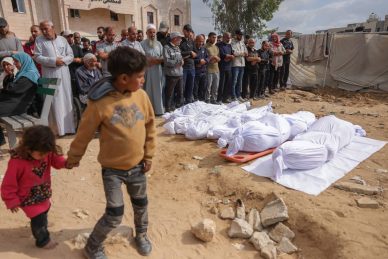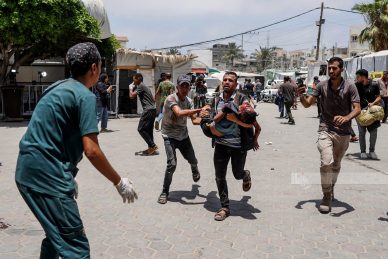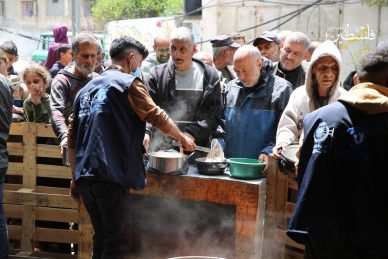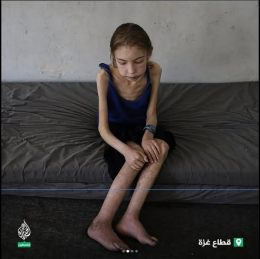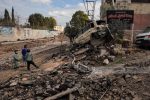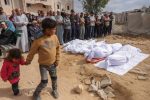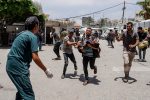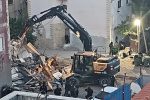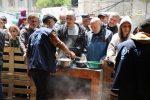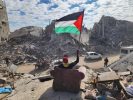GAZA, (PIC)
“I feed my children sugar and water… but if they opened a corridor for us to leave in exchange for raising a white flag, we wouldn’t go.”
With these words, Umm Mohammad Mushtaha, displaced from Beit Hanoun town to the Rimal neighborhood in Gaza City, summarizes the steadfastness of the people of Gaza in the face of Israel’s policy of starvation and submission.
Nineteen months of aggression, deliberate aid cuts, systematic destruction of warehouses and bakeries, and a ban on the entry of fuel and flour — none of this succeeded in deterring Palestinians from the path of resistance. Instead, it created a new layer of “martyrs of hunger,” and icons of dignity whose names are repeated like those of fallen fighters.
We ate tree leaves
Abu Hassan Musabeh, a resident of Jabalia who was deprived of aid, said: “We had a fig tree at home. We cut its leaves and cooked them. We ate them, then we got sick. But we don’t regret it. If the occupation offered us food in exchange for normalization, we wouldn’t accept it.”
In Al-Shifa Hospital lies Adam Abu Al-Qumbaz, a three-year-old child, his body frail and barely breathing. His mother weeps: “They told us the occupation is deliberately preventing milk and vitamins from entering for our children. We know — they want us to weaken and surrender. But we teach our children that hunger is more bearable than humiliation.”
The losing bet
Observers believe that the Israeli occupation army relied on hunger as a weapon to break the popular base of the resistance. But the opposite happened. Hunger deepened hatred of the occupation and increased determination to stay — especially with rising global solidarity with Gaza.
They note: “The occupation believes economic and psychological pressure can break our willpower. But it still doesn’t understand that those who chose to stay under bombardment won’t leave because of hunger.”
Bread and dignity
Bread lines have turned into scenes of epic endurance. One survivor of a massacre during aid distribution said: “We knew the planes were watching us, but we went anyway. We’d rather die seeking a dignified bite than stretch our hand to the enemy.”
International relief organizations, led by the World Food Program, have described what’s happening in Gaza as the first fully documented famine in decades.
Still, the global community remains a spectator — issuing statements of concern, while some states indirectly participate in the siege by restricting aid or politically justifying the aggression.
Silence is complicity
Human rights advocate Salah Abdel-Ati, head of the International Commission for Human Rights, told the Palestinian Information Center: “International law prohibits the use of starvation as a weapon of war, but in Gaza this crime is being committed daily.”
He added: “Global silence is not just complicity — it is partnership in the crime.”
The free pulse of Gaza
In shelters, where displacement blends with fear, mothers speak of a different kind of pain.
Umm Youssef Nasr, a mother of five, says: “My children ask me, ‘Mama, when will we eat bread?’ And I laugh and say, ‘Soon’… but I don’t have an answer. Sometimes I squeeze a lemon into water and give it to them as a meal.”
Gazan women are no longer just mothers — they are cooks from nothing, doctors without medicine, and teachers in classrooms of pain. They are the first line of defense for life.
From Nuseirat refugee camp, 22-year-old Ibrahim Farajallah recounts: “I received an offer from relatives in the West Bank to leave through Rafah with help from an organization. But I refused. I said: I will live and die here, on my land. Hunger is kinder than living exiled.”
Ibrahim’s words capture a pure Palestinian equation: Dying on the homeland’s soil is better than living in tents of political exile.
Hunger may linger, and bodies may be besieged, but Gaza has proven that the spirit born from siege does not break. What the Israeli war machine fails to understand is that people who endure starvation in silence ignite their power in a moment of dignity.
Gaza today is not a victim of hunger, but a mirror reflecting the moral fragility of this world. And it cries out to history: We will not bow — even as we die of hunger.


